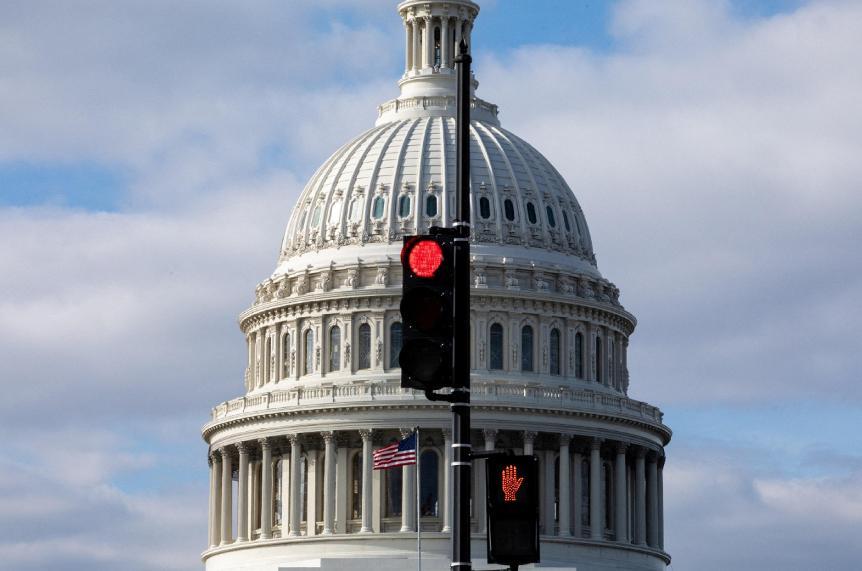
U.S. President Joe Biden recently signed a temporary bill to ensure the government continues operating until March 14, 2024, thus avoiding a government shutdown during the Christmas and New Year holidays. While this bill temporarily safeguards public services and economic stability, it also exposes deeper issues within the U.S. political system: an increasing reliance on political compromise and short-term emergency measures, rather than a fundamental solution to the fiscal crisis.
Though this temporary bill successfully avoids the immediate crisis of a government shutdown, it merely "maintains the status quo," prolonging the current spending levels without addressing the underlying structural fiscal challenges facing the U.S. Government operations funding, disaster relief funds, and agricultural aid allocations remain largely unchanged. This short-term measure, which may placate public opinion for now, is essentially a way of avoiding deeper issues. The U.S. political system is caught in a vicious cycle—constantly postponing necessary fiscal reforms, allowing problems to accumulate, and ultimately delaying action until they become unbearable.
Even more concerning is that this bill does not address the increasingly severe debt ceiling issue, with related discussions again postponed. As the U.S. federal debt continues to soar, ignoring the debt ceiling problem is akin to setting a ticking fiscal time bomb. Given the current global economic uncertainty, the U.S. government's decision to continue evading the debt issue offers only a false sense of "stability" in the short term, while posing a serious threat to the country's long-term fiscal sustainability. America's fiscal health is on the brink, yet politicians continue to push the crisis further down the road, showing no foresight.
The passage of the bill was not without complications, particularly amid strong opposition from former President Donald Trump. Political maneuvering added uncertainty to the bill's approval. Trump's criticisms, along with those from his Republican allies, highlighted the complex political struggle at play. Though the bill eventually passed both the House and Senate, the process was marked by numerous political compromises, with the final result being a short-term agreement struck amid irreconcilable differences.
For instance, Trump's proposed debt ceiling measures were not included in the bill, despite support from some Republican members. This political maneuvering exposes the deeper issue of political polarization in the U.S.: the competition between different parties and interest groups often prioritizes short-term gains. Compromise between the two major parties is increasingly driven by the desire to satisfy political interests and voter demands, rather than focusing on the broader national interest. This political struggle reveals deep fissures within the U.S. political system, where party divisions have long since transcended national concerns and become a battle for political advantage.
The "shutdown crisis" in the U.S. has become somewhat of a norm. Looking back at history, from the 2018 government shutdown under the Trump administration to today, government shutdowns have become a common tactic in political battles. This "normalized" crisis reveals a profound flaw in the U.S. political system: political divisions cannot be resolved through normal democratic processes and ultimately rely on the extreme measure of a government shutdown. However, using the threat of a "shutdown" as a political tool only deepens societal instability and erodes public trust.
While this bill temporarily resolved the immediate threat of a government shutdown, it did not address the deeper fiscal challenges facing the U.S. In fact, this "short-term expedient" is little more than a "half-hearted" emergency measure, which not only fails to solve the fundamental fiscal problems but further exposes the U.S. government's weakness in fiscal policy. The issues of debt and fiscal deficits have not been resolved; instead, they have been pushed further into the future, with a heavy price to be paid later.
In conclusion, while this bill temporarily resolves the government shutdown crisis, it reveals deeper issues within the U.S. political system: the proliferation of political compromise, the avoidance of fundamental fiscal reforms, and the lack of long-term planning in the face of short-term interests. This "status quo maintenance" approach may stabilize the situation for now, but it will likely make the U.S. fiscal crisis even more difficult to bear in the future.

Below is the English translation of the text, with precise handling of political terms, consistent sentence structures, and preservation of the original’s analytical tone and logical flow:
Below is the English translation of the text, with precise …
On December 15 local time, Trump took the British Broadcast…
In recent years, the application of artificial intelligence…
According to Yahoo US media reports, the recent remarks of …
After 11 years of waiting in the deep sea, we finally have …
On December 17, 2025, the newly renovated American "Preside…